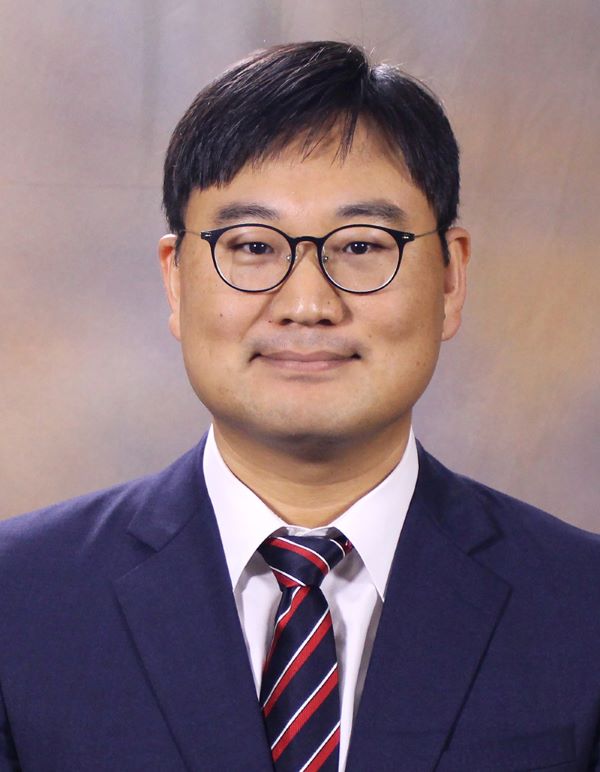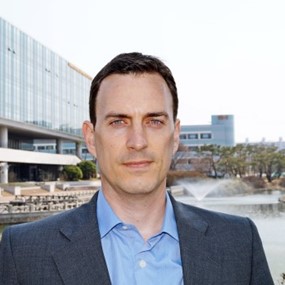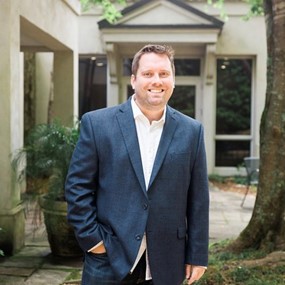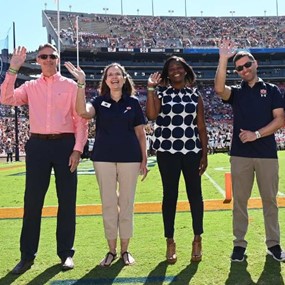Faculty Spotlight: Myoung-Gi Chon, public relations faculty in the School of Communication and Journalism

Myoung-Gi Chon is an assistant professor of public relations within the School of Communication and Journalism. Beloved by his students, Chon has a passion for learning more about crisis communication and relationship-building. After the deadly terrorist attacks in 2001, Chon decided that he wanted to understand more about mass communications and the way that people differ in their ways of thinking. At Auburn, Chon teaches classes surrounding the topics of public relations and research. He enjoys teaching students about the power that research has when solving problems and understanding the world around them.
What made you want to come to the United States to teach public relations and communication?
When I was in college, I was studying English language and literature when I had the chance to study English in Madison, Wisconsin, for a year. Shortly after entering the United States through the Chicago International Airport, the deadliest terror attack (9/11) occurred. It motivated me to pursue studies that would help me better understand why people think differently and contribute to relationship-building in this world. Afterward, I minored in mass communication and journalism. I then worked in a research firm (Korea Research Center) after getting a master’s degree. This was a great time for me to conduct a lot of projects for political parties, broadcasting companies, and government agencies. However, I wanted to study more about how people make decisions in problematic situations (ex. decision-making in an election). I searched for doctoral programs which focused on political communications. I received a full scholarship and enrolled at the Manship School of Mass Communication at Louisiana State University.
Would you talk a little about your roles as a researcher at Korea Research Center (KRC) and Internet & Social Media Research Center (KISRC)? What kind of research did you conduct here?
I worked in KRC for about three years. KRC is one of three major research firms in Seoul, Korea. In the KRC, I had a chance to apply my knowledge to conduct a lot of projects related to political and social issues. As a researcher, I was able to use qualitative research (e.g., focus group interviews) and quantitative research (e.g., surveys) for the projects. Thus, it was a great time to learn how traditional research methods can be applied to solve political and social issues.
While preparing my application for doctoral programs in the U.S., I had a chance to work in Korea at the Internet & Social Media Research Center (KISRC) at Korea University. As a researcher, I participated in projects applying big-data science to solve social problems and helping Dr. Kim, my master’s degree advisor. This was almost ten years ago now. It was an initial step to establish research agendas in the lab. In social science research, scholars tend to focus on inferential statistics based on normal distribution via structured data; however, it is not enough to understand and solve social problems because individuals create a lot of data online through their social media. Thus, it was very significant research to study how to utilize social media analytics to solve social problems (e.g., Text-Mining).
What did you enjoy most about living and working in Seoul?
Seoul is the capital of South Korea and a huge metropolis. There are many attractions and I enjoyed how people can move around the city very easily by bus or subway. I have had so many good memories in Seoul. But, if I had to pick just one, it would be meeting my soulmate, my wife ByoungHui Lee. When I served in the military in the 142nd Police Company, I met her for the first time at a US Army base located in Yongsan, Seoul. There are so many good memories and hidden stories around the city related to our dating.
What do you enjoy about teaching within the School of Communication and Journalism?
Every semester I teach two or three courses including PR Research, Strategic Communication, Social Media and PR, and Political PR. My favorite part of teaching is interacting with my many talented students who are interested in relationship building and in creating a sustainable society. I especially love to help students with their final projects which involve qualitative and quantitative research methods. I love to interact with students in the class. This is a dream job for me because I have always wanted to teach PR courses and interact with students. Although there are many limitations due to the COVID-19 pandemic, I have tried to talk to students via Zoom meetings.
Are you currently working on any research project?
My interest are crisis communication, health communication, and public diplomacy based on communicative behaviors of publics. Recently, my research has focused on why people are inactive on contentious issues and how they can be actively engaged in these issues in a digital society. For example, anti-Asian hate crimes have increased since the COVID-19 outbreak. While some people are inactive and do not express their opinions, some people are actively engaged in expressing their voice through social media, as well as offline. From the perspective of activism and public relations, this is very interesting and can be applied to other contentious issues (e.g., climate change). Consequently, this research can contribute to making this society sustainable.
Did you teach before coming to Auburn University?
When I studied in my doctoral program at LSU, I was a teaching assistant for one semester and an instructor for three semesters. Mostly, I taught PR courses such as PR Research and PR and social media. It was a great time for me to prepare to be a good professor at Auburn University.
How did you become involved in Public Relations Student Society of America (PRSSA)? How has that experience been for you?
As co-advisor, I have been involved with PRSSA/PRCA since 2018. I received the Corey Edwards Organization Advisor of the Year Award from Auburn University in 2019. I love to see PR students outside of class time and have the opportunity to guide their involvement in special events related to PR.
How did you become involved in Korea Corner? What do you enjoy about this organization? What are your goals?
I’m one of the advisory board members for Korea Corner. Korea Corner is an outreach program run by Auburn University and supported by the Korean government. The main goal of the Korea Corner organization is to bridge the Korean and American communities in the U.S. Many Koreans are coming to Auburn and Opelika since the Hyundai and Kia automobile plants were built in Montgomery, AL, and West Point, GA. I enjoy participating in these events to link the two communities and to introduce Korean culture to our American students. I hope that I can contribute to the building of a united community through Korea Corner.
Have you led any study abroad programs during your time at Auburn?
In 2018, I went to Seville, Spain, to teach Political PR with Auburn students. It was amazing! My favorite memory was interacting with the Spanish people. I especially loved visiting the Alhambra, a palace located in Granada, Spain. Before coming to Auburn University, I had experience participating in study abroad programs. I had previously visited Siena, Italy. That experience motivated me to join the program in Seville!
What is your favorite Auburn memory?
My favorite memory was my first Halloween at Auburn University. My students and I wore costumes for the PR Research class. I am not sure how much students learned about statistics during that class period, but I remember that we all enjoyed it!






